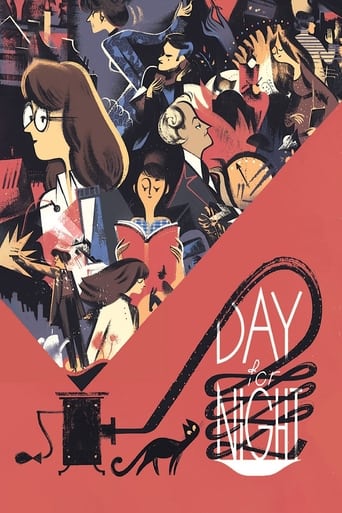vitachiel
Movie about a movie who's director is the director of the movie's movie. Nice to have a look behind the scenes of film making, although much of it looks rather staged, including bad acting and over-acting. Which makes the fictional movie about people making a movie really looks like people making a fictional movie. In a movie that you don't really like, sometimes there's one scene that almost makes up for the rest of the movie. A scene that you will probably never forget. Like the Japanese guy doing a karaoke act of the Sex Pistols in Lost In Translation, here the WOW scene is the short cat intermezzo. Silence... tension...touched... A moment of true movie magic.
Barbouzes
Truffaut -how shall I say this?- is grossly overrated. I did my homework: I have now seen 5 of his movies and I am stunned by the attention such an inept filmmaker has commanded over the years in critics' writings. What on earth is there to praise in Truffaut's flaccid movies? They all feel to me like a high school kid fond of cinema made them: immature and clichéd in both content and form. Critics, open your eyes: this a filmmaker who has botched every good plot he was given (Mississipi Siren, Les 2 Anglaises et le Continent, The Bride Wore Black) misused great actors (Catherine Deneuve, Jeanne Moreau) and overused very bad actors (Jean-Pierre Leaud, who, after his miraculous turn as a child in The 400 Blows, was never able to speak or act in a compelling or even noticeable manner. There he is again in Day For Night, flat as a failed soufflé, bland as porridge. And we are supposed to believe he seduces Jacqueline Bisset in this story?! Casting, people, casting!) Day For Night features characters that are cardboard cutouts, actors that have clichés dialogs to emote to, situations that feels forced or trite. It is lightweight material, from which you come out vaguely entertained, and mostly frustrated: what a waste of time, and all this national and international praise for such fluff? Did I learn anything from this movie? Did it make me think, did parts of it resonate in my life or mind, did it make me want to see more or do something better with my life? Was there any real emotion on screen?I saw recently in my local art house theater "A Nos Amours" of Maurice Pialat. Same country, same generation of filmmaker, but oh what a difference of authenticity and competency. Time to throw off the false gods and promote quality: bury Godard, forget Truffaut -watch Pialat, and feel something.
gavin6942
A committed film director struggles to complete his movie while coping with a myriad of crises, personal and professional, among the cast and crew.I find it interesting that in French the term "American night" means the same as our term "day for night", wherein scenes filmed during the day appear to be shot at night (although discerning eyes can still tell the difference). Why "American night"? Interesting.One of the film's themes is whether or not films are more important than life for those who make them, its many allusions both to film-making and to movies themselves (perhaps unsurprising given that Truffaut began his career as a film critic who championed cinema as an art form). The film opens with a picture of Lillian and Dorothy Gish, to whom it is dedicated. In one scene, Ferrand opens a package of books he had ordered: they are books on directors he admires such as Luis Buñuel, Carl Theodor Dreyer, Ingmar Bergman, Alfred Hitchcock, Jean-Luc Godard, Ernst Lubitsch, Roberto Rossellini and Robert Bresson.
Lechuguilla
Making a movie can be grueling work. It can also be boring with lots of downtime, depending on level of contribution. Clashing egos, financial problems, technical glitches, snafus and pressures of all kinds also are common on movie sets. It's a grubby business, hardly the idolized fantasy of outsiders.The film's director Francois Truffaut plays the role of director Ferrand on the movie set of "Meet Pamela", the film within a film. All kinds of people participate in the making of "Meet Pamela", including the producer, the stunt man, sound man, prop man, and script girl. There's also a recalcitrant cat that won't do what it's supposed to do in its appointed scene. "We'll shoot the scene when you can dig up a cat that can act", growls the director. Funny stuff. Through it all, Ferrand does the best he can. And viewers get a peek at what goes into making a movie."Day For Night" belongs in the comedy-drama genre. There are funny moments. There are also quite serious moments. Some of the characters come across as insecure prima donnas, like the actress Severine (Valentina Cortese) who gets frustrated because she keeps opening the wrong door in one of her scenes. And midway through, a scene proves tragically prophetic, but it's very subtle.It's a talky film with the immense dialogue of a stage play. Which might explain why the film's pace seems speeded up. Dialogue is rushed, with a conspicuous absence of natural pauses in people's conversations. As such, "Day For Night" comes across as a bit contrived, forced, put-on. Which it is. But viewers are supposed to be getting the opposite impression. That's my main complaint, though, additionally, I would have recast the role of Alphonse.As movies about movies go, "Day For Night" is one of the better ones. Viewers do get a peek behind the camera. But the entire film is still fictional. And viewers would be mistaken if they assumed that "Day For Night" is movie-making realism.





